| Srl | Item |
| 1 |
ID:
096184


|
|
|
| 2 |
ID:
093367
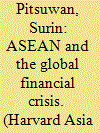

|
|
|
| 3 |
ID:
088853
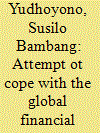

|
|
|
| 4 |
ID:
094355
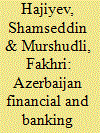

|
|
|
| 5 |
ID:
087648
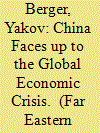

|
|
|
|
|
| Publication |
2009.
|
| Summary/Abstract |
China's growing involvement in the global economy and politics brings it considerable benefits. China gets unrestricted access to world markets for goods and services to supply to, to natural resources and fuels, new technologies and modern managerial know-how, and to international organizations that adopt decisions critical to China's development. All these benefits are acquired at the cost of the country's rising dependence on worldwide developments, market ups and downs, and even worldwide cataclysms.1 The current global financial and economic crisis shows this beyond a shadow of doubt. Accordingly, debates are erupting now and then in China about the balance of gain and loss; about the best way to use the advantages of being involved in globalization and to avoid its most destructive consequences; and also about what is needed to maintain the country's economic and political sovereignty and security without fencing itself off from the rest of the world, but instead take the position of a responsible participant and agent of world history.
Crises in the free-market economy that China is determined to build are certainly unavoidable. The key issue is then to realize that the market, the principal advantages of which are higher competitiveness of enterprises, the state itself, and individuals, cannot correct its inevitable deficiencies all by itself. While promoting a free-market economy, therefore, China is seeking to keep very power-
|
|
|
|
|
|
|
|
|
|
|
|
|
|
|
|
| 6 |
ID:
108411
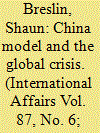

|
|
|
|
|
| Publication |
2011.
|
| Summary/Abstract |
The global financial crisis reinvigorated ongoing debates over whether China has its own distinct and separate 'model' of political economy and/or development. There is much that connects this Chinese model with previous systems of national political economies; partly in terms of specific policy preferences, but also in terms of shared basic conceptions of the distribution of power in the global order. Like these previous systems, China has come to stand as an example of an alternative to following dominant (neo-)liberal models of development. In this respect, what the China model is not and what China does not stand for might be more important than what it actually is and what it does stand for. However, the idea of a coherent and unique Chinese model has considerable purchase, and is both informed by and also feeds into considerations of China's uniqueness and difference from the norms, ideas and philosophies that dominate the rest of the world.
|
|
|
|
|
|
|
|
|
|
|
|
|
|
|
|
| 7 |
ID:
192506


|
|
|
|
|
| Summary/Abstract |
This paper analyzes trends and factors of Chinese economic growth in recent years (2017-2022). It pays particular attention to the role of foreign trade and cross-border capital movement in China's economic development, as well as to the status of its debt position. It also draws a number of conclusions about prospects for the growth and evolution of China's economic development model.
|
|
|
|
|
|
|
|
|
|
|
|
|
|
|
|
| 8 |
ID:
093371
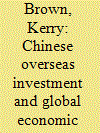

|
|
|
| 9 |
ID:
093373
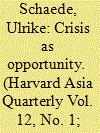

|
|
|
| 10 |
ID:
139583
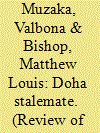

|
|
|
|
|
| Summary/Abstract |
This article challenges conventional narratives that suggest that the travails in the Doha Round, the shift to bilateral free trade agreements, and the broader unfolding of the global crisis collectively presage the decline of either the WTO or the broader institution of multilateral trade. We question the extent to which recent trends can indeed be said to constitute a genuine crisis of trade multilateralism by reflecting upon the contradictory and ambiguous nature of the multilateralism of the past, and also upon how contemporary multilateralism has been framed with reference to it. Our main finding is that, in contrast to the many short and medium-term symptoms which tend to appear in the conventional story of multilateral decline, there is actually a far more worrying long-term trend which underpins the varied conflicts that characterise contemporary trade politics: the fundamental lack of a shared social purpose between the developed countries and the more powerful emerging countries on which a stable, equitable, and legitimate edifice of multilateral trade rules can be erected, institutionalised, and enhanced.
|
|
|
|
|
|
|
|
|
|
|
|
|
|
|
|
| 11 |
ID:
086407
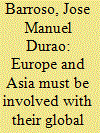

|
|
|
|
|
| Publication |
2009.
|
| Summary/Abstract |
I wish to welcome the new members of ASEM. With the summit in Beijing of 24 October 2008 Europe is able to engage virtually the whole of Asia through ASEM. This is cause for celebration, and it means that we will be even better placed to advance our shared policy goals in the international arena.
|
|
|
|
|
|
|
|
|
|
|
|
|
|
|
|
| 12 |
ID:
129536
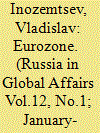

|
|
|
|
|
| Publication |
2014.
|
| Summary/Abstract |
The euro is a young currency that has all chances to make Europe a global player if the problems associated with its "premature birth" are solved in a decisive manner. The fiscal authorities should resort to extraordinary measures in order to accelerate economic growth, reduce unemployment, and boost the continent's competitiveness. For years the economic situation in Europe has been a matter of deep concern to politicians and economists. The European Union remains the largest economic power in the world, accounting for more than 20% of global gross product, possessing a huge export potential generating up to 16.4% of international trade with 161 of the world's top 500 companies, and with ample technological and financial resources. However, the EU economy is growing way too slow and its problems are becoming increasingly noticeable. The reason for this has been mentioned many times: poorly regulated public finance in the eurozone countries, which became particularly obvious during the global crisis of 2008-2009.
|
|
|
|
|
|
|
|
|
|
|
|
|
|
|
|
| 13 |
ID:
093181
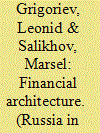

|
|
|
| 14 |
ID:
088771
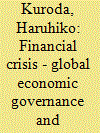

|
|
|
| 15 |
ID:
178133
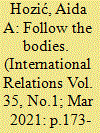

|
|
|
|
|
| Summary/Abstract |
Global Capitalism, Global War, Global Crisis by Andreas Bieler and Adam Morton makes a persuasive case for the enduring relevance of historical materialism as the hermeneutical tool for analysis and understanding of contemporary political economy.
|
|
|
|
|
|
|
|
|
|
|
|
|
|
|
|
| 16 |
ID:
178136
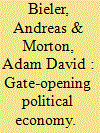

|
|
|
|
|
| Summary/Abstract |
There is a spirit of critique that is dialogical, sincere, and rigorous that defines this forum on Global Capitalism, Global War, Global Crisis from authorities we regard as shaping the recent past, the now present, and the near future of political economy.
|
|
|
|
|
|
|
|
|
|
|
|
|
|
|
|
| 17 |
ID:
093405
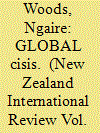

|
|
|
| 18 |
ID:
087863
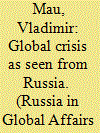

|
|
|
|
|
| Publication |
2009.
|
| Summary/Abstract |
The global economic crisis is rapidly growing and it is difficult to say yet how long it will last. Forecasting the future of this crisis is as senseless as forecasting crude oil prices. When they were high, the only thing one could say confidently was that prices would eventually fall some day. In much the same way, one can be sure now that the crisis will end one day, although neither when that will happen, nor the amount of damage, nor the layout of the post-crisis economy are known yet.
The crisis Russia went through in 1998 had domestic roots - a weak government incapable of conducting a responsible macroeconomic (budgetary, in the first place) policy. The current situation is markedly different: for the first time ever, this country is coming to grips with a world crisis as part of the global economic and financial system. This signifies that Russia is gradually turning into a normal market economy.
|
|
|
|
|
|
|
|
|
|
|
|
|
|
|
|
| 19 |
ID:
128580
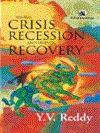

|
|
|
|
|
| Publication |
New Delhi, Orient Blackswan Private Limited, 2011.
|
| Description |
xxv, 421p.Hbk
|
| Standard Number |
9788125041856
|
|
|
|
|
|
|
|
|
|
|
|
Copies: C:1/I:0,R:0,Q:0
Circulation
| Accession# | Call# | Current Location | Status | Policy | Location |
| 057666 | 330.90511/RED 057666 | Main | On Shelf | General | |
|
|
|
|
| 20 |
ID:
088835
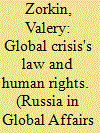

|
|
|